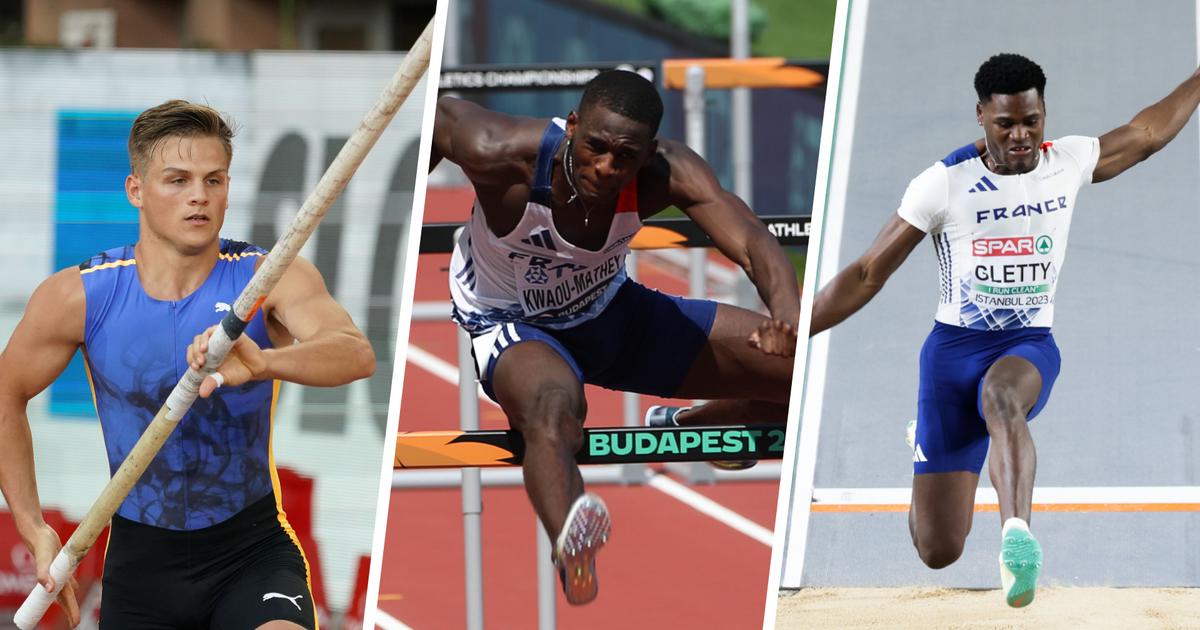In Munich's Olympic final, he starts on the inside lane, where the curves are the sharpest. But he has an advantage. Most runners are set on an anklebone and have to count their steps between the hurdles, so as not to get out of step. He, on the other hand, can jump right and left.
John Akii-Bua takes the hurdles as they come. On the train and otherwise in life.
Born on December 3, 1949, John Akii-Bua grew up with 42 siblings in northern Uganda. From an early age he had to guard the cattle herd of the family and be constantly on guard against lions, baboons or giant snakes. Sometimes the father organized sweets races among his children. John always went empty-handed. He was not fast enough. Not yet.
At 16, he moved to the capital Kampala, worked in a bar and later went to the police, where Uganda athletics coach, the Brit Malcolm Arnold, attracted his attention. At first Akii Bua ran 110 meters hurdles, but missed the qualification for the 1968 Olympics and moved to the 400 -meter distance. From year to year he was faster and reached 1971 with 49.0 seconds already the Africa record.
In the Porsche to Lake Starnberg
The 400 meter hurdles are also called "Mankiller". To increase his stamina, Akii-Bua practiced distances up to 1500 meters. To strengthen his muscles, he ran with eleven kilo lead vest. His bounce he increased by hurdles, which were ten inches higher than in competition. And he trained twice a day, seven days a week.
At the same time he knew how to enjoy the hours away from the racetrack, says Dieter Büttner, now 70. He traveled in 1972 as the reigning German champion over 400 meters hurdles to Olympia in Munich. Both got along straight away, spent a lot of time together in the Olympic Village or drove with Büttner's orange Porsche 914 to Lake Starnberg.
photo gallery
18 pictures
Record Runner John Akii-Bua: Celebrated, envied, forgotten - the too-short life of John Akii-BuaBüttner describes Akii-Bua as a fun-loving guy and gifted athlete: "Many hurdlers have taped their feet in such a way that they only put on the ball to be faster." John did not need that - "he did not have big calves, he hardly raised his knees when jumping, his Achilles heels were like steel springs".
In the semi-final of Munich Akii-Bua ran the fastest time, and yet hardly anyone trusted him a medal. The night before the final, he found no peace and imagined the race again and again in the inner eye, but every time saw David Hemery in front of him. The Briton had brought in the '68 games in Mexico in 48.12 seconds. On the final day, Akii-Bua could not eat, too nervous. Until his coach came to him ten minutes before the start and said only one sentence: "One of them is yours."
He breaks the 48-second limit
September 2, 1972, the final: Hemery is running faster than his world record four years earlier in the first 200 meters. Akii-Bua has the disadvantage of the inner web. But at the beginning of the home stretch they are already on the same level. Then the Ugandan sprinter pulls away, reaches the finish by a wide margin - and keeps running. He takes the first hurdle again.
Only then Akii Bua slows down, turns to the scoreboard and can hardly believe it: "47.82" and the flashing letters "NWR". New world record. The first hurdler on the stadium lap under the magic limit of 48 seconds. And never before has an athlete from Uganda brought Olympic gold.
Dieter Büttner says, "Before the games we were all fast, he was world record holder and he was surprised by himself."
Not a full minute has John Akii-Bua needed to become world famous. It is still the merry games of Munich. And if someone stands for it, then the slim, constantly smiling sprinter from Uganda. But on September 5, Palestinian terrorists take eleven Israelis hostage. In case of a failed liberation attempt all hostages, five assassins and one police officer die.
"After the end of the games, which were characterized by violence, grief and disgust," wrote later the US sports magazine "Sports Illustrated", "it seemed like Akii-Bua symbolize most what they could have been."
Folk hero in the offside
The gold medal makes him a folk hero in his homeland. The race was not shown on television - Idi Amin has banned it. Since he assassinated in 1971, the dictator has dominated the country with violence and the certainty that "no one runs as fast as a bullet".
Amin acts like the horror clown among Africa's despots. He does not tolerate anyone next to him. Certainly not if he is like Akii-Bua Christ and belongs to the tribe of Langi, whom the tyrant pursues and hundreds of thousands murder.
But Akii-Bua is too famous to disappear in a mass grave. Amin has given him another role and receives the Olympic champion with state honors, naming a street in Kampala after him, advancing him to senior police officer. Whenever foreign guests accuse Amin of human rights violations, he points to Akii-Bua and his nephew, national footballer David Obua: "You say I kill Langi, here they are!"
Uganda becomes a prison for Akii-Bua. He is hardly allowed to start abroad, he rarely dares to go to the training ground for fear of an attack and still does not dare to escape, out of concern for his family. In 1976 he travels to Montreal for the Olympics, but he is whistled back shortly before the start.
Previously, New Zealand rugby team has denied a match in South Africa, which is outlawed internationally because of the apartheid regime. Uganda and 15 other African countries boycott the summer games in 1976. When Akii-Bua flies back to Uganda, the 20-year-old American Edwin Moses runs to gold. In 47.63 seconds - broken world record.
Escape to Germany
At home, Akii-Bua rapidly expects alcohol and nicotine. In 1977 there are rumors that he has been arrested. But Amin's rule is coming to an end. The invasion of neighboring Tanzania fails. When Tanzanian troops capture Kampala in April 1979, the two most famous Ugandans are already on the run.
While Amin saves himself by plane to Libya to his friend Muammar al-Gaddafi, Akii-Bua travels to Kenya with his pregnant wife and children. There they first land in a refugee camp, where they accidentally discovered a television crew. Akii-Bua's wife had a premature birth while fleeing, the child did not survive a whole day. "I've never felt so miserable," Akii-Bua says into the camera.
In 1979 he is released, his German sponsor brings him and his family to Germany and hires him as a brand ambassador. From here he starts his comeback and joins again in 1980 at the Olympic Games in Moscow, but retires in the semifinals. In Germany, he is more and more homesick. "Here's everything, but your heart is far away," he tells the "kicker."
In 1983 he returns to Uganda and has big plans, he wants to build a training camp for young athletes. But the hurdles of life are not so easy to skip. The country is on the ground after the war, the infrastructure is destroyed. Akii-Bua lacks relationships and money. For a while he works again as a police officer, later he becomes national coach. Gradually, however, it gets quiet around him.
An "Olympic hero"
Dieter Büttner also keeps in touch with Akii-Bua and his family for a long time: "His daughter later emphasized again and again that her father's mistake was to return to Uganda."
On June 22, 1997, the past also caught up with its discoverer Malcolm Arnold. He recalls the remarkable TV documentary "The John Akii-Bua Story: An African Tragedy": The Munich Olympic Stadium is currently running the European Athletics Cup, Arnold is now training the British athletes. When looking into the arena, he has to think again of his former protégé, who has escaped exactly 25 years ago. Arnold is quite in his thoughts when a journalist approaches him: "Did you already know?"
Two days earlier, John Akii-Bua died of cancer at the age of 47 in a hospital in Kampala. He receives a state funeral. "Olympic hero" is standing on his tombstone. For a long time, he will remain the only one in the country. Only in 2012 in London wins marathon runner Stephen Kiprotich the second Olympic gold medal for Uganda.









